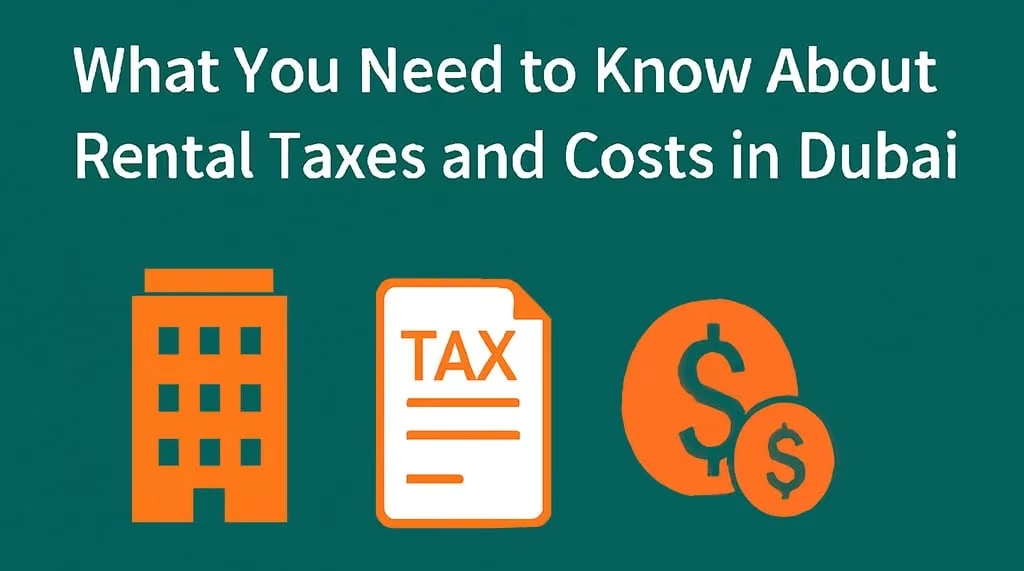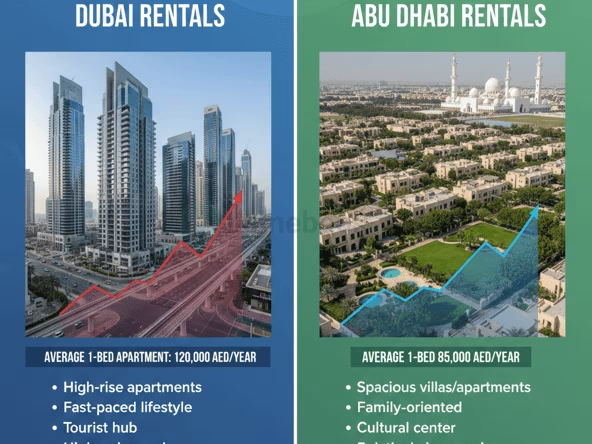Renting a property in Dubai involves more than just signing a contract and paying monthly rent. Behind the scenes, there are legal frameworks, taxes, service charges, registration fees, and responsibilities that both landlords and tenants need to understand. Dubai’s real estate market is known for its diversity and rapid growth, offering everything from high-rise luxury apartments to affordable townhouses in family-friendly communities. Whether you’re new to the city or have lived here for years, understanding the full cost picture and your legal obligations is essential. Being informed not only helps you budget more effectively but also protects you from unexpected fees, legal issues, or misunderstandings throughout your tenancy.
Overview of Dubai’s Rental Framework
Dubai has one of the most active and diverse rental markets in the region. From high-rise apartments in Downtown to villas in Arabian Ranches, rental prices and conditions can vary widely. To keep the market stable and transparent, the Dubai government has introduced several rules and platforms that regulate the relationship between landlords and tenants.
These rules are designed to:
- Protect the rights of tenants and landlords
- Prevent unfair rent increases
- Resolve disputes quickly and affordably
- Bring clarity to taxes, service charges, and legal fees
To understand rental taxes and costs in Dubai, we’ll break things down into several sections: taxes, legal procedures like Ejari, housing fees, service charges, and the role of government entities like the Rental Dispute Center.
Housing Fees and Service Charges: Who Pays What?
What Are Housing Fees?
In Dubai, all tenants are required to pay a housing fee, which is calculated at 5% of the annual rent. This fee is added to your DEWA (Dubai Electricity and Water Authority) bill and spread across 12 months. So, if your rent is AED 60,000 per year, you’ll pay a housing fee of AED 3,000—about AED 250 per month.
Service Charges: Landlord’s Responsibility
Service charges are different from housing fees. These are the costs associated with maintaining the building or community—things like cleaning common areas, maintaining elevators, security staff, and landscaping.
Service charges are the landlord’s responsibility, not the tenant’s. However, in some cases, especially in private contracts or short-term lets, landlords may try to pass these costs onto the tenant. If you’re renting long-term, make sure your contract clearly states that service charges are covered by the landlord.
Understanding Ejari: Legalizing Your Lease Agreement
What is Ejari?
Ejari is an official system introduced by the Dubai Land Department to register rental agreements. The word “Ejari” means “my rent” in Arabic. By registering your lease, your tenancy contract becomes legally binding and enforceable.
Why is Ejari Important?
Without an Ejari registration:
- You cannot open a DEWA account
- You can’t sponsor family visas
- You are not protected under rental dispute laws
- You can’t file complaints or disputes with the Rental Dispute Center
Who Pays for Ejari?
Technically, Ejari registration costs AED 220, and this is the tenant’s responsibility unless the landlord agrees otherwise. Some real estate agents include this fee in their service, but you should always confirm. You can register your Ejari online, through the Dubai REST app, or at any typing center.
VAT and Its Impact on Rental Properties in Dubai
Are Rents Subject to VAT?
In most cases, residential rent in Dubai is exempt from VAT (Value Added Tax). This means if you’re renting an apartment or villa as your place of residence, you won’t be charged VAT on the rent.
However, VAT does apply to:
- Commercial leases
- Service charges paid by landlords to property management companies
- Short-term stays that function like hotel services (for example, furnished rentals for less than 6 months)
If you’re a landlord renting out a commercial property, or managing multiple furnished units as holiday homes, you may need to register for VAT and charge accordingly.
How Does VAT Affect Tenants Indirectly?
Even though tenants don’t pay VAT on rent directly, they may feel the impact indirectly. For example:
- Landlords may raise rental prices slightly to cover VAT costs on service providers
- Utility companies, maintenance services, and third-party agencies include VAT in their pricing
So, while the rent itself may be VAT-free, the overall cost of living in the unit could be higher due to VAT-inclusive services.
Corporate Income Tax (CIT) and Foreign Investors
New CIT in the UAE
As of 2023, the UAE introduced a federal Corporate Income Tax (CIT) of 9% on profits above AED 375,000. This primarily affects companies, but it can also impact foreign property investors and businesses involved in real estate.
Do Individual Property Owners Pay CIT?
Individual landlords (residents or non-residents) who rent out a few properties for personal income do not have to pay CIT, as long as:
- They are not running the rentals as a business
- They are not registered as a corporate entity
However, if a foreign investor operates a portfolio of properties through a registered company in Dubai (such as a real estate LLC), then they might fall under the CIT framework.
What About Personal Income Tax?
There is no personal income tax in the UAE, which is one of the key reasons expats and investors are drawn to Dubai. So, rental income from residential properties owned by individuals is not taxed at the federal level. This creates an attractive environment for property investment, especially for those seeking stable, long-term returns.
Rental Dispute Center: What Happens in Case of Conflict?
The Role of the Rental Dispute Center (RDC)
The RDC was set up by the Dubai Land Department to handle disputes between tenants and landlords. It offers a faster, more affordable alternative to the traditional court system.
Common issues handled by the RDC include:
- Disputes over rent increases
- Evictions
- Maintenance responsibilities
- Contract renewals or terminations
How to File a Complaint
To file a case with the RDC, you need:
- A valid Ejari registration
- Proof of communication with the landlord or agent
- Payment of a service fee (generally 3.5% of the rental value)
Cases are usually resolved within a few weeks, and the decisions are legally binding for parties.
Regulated Rent Increases and RERA’s Role
Understanding Rent Caps
Dubai’s Real Estate Regulatory Agency (RERA) provides a rent calculator that landlords must follow before increasing rent. The law protects tenants from sudden or unfair increases.
Key rules:
- Landlords cannot increase rent in the first two years of the tenancy
- After that, increases must follow RERA’s guidelines based on average market rates
- Tenants must receive 90 days’ written notice if the landlord intends to raise rent
This rent control policy helps keep rental prices fair and predictable.
Taxes and Fees for Foreign Property Owners
Foreigners can buy and rent out property in designated freehold areas in Dubai. If you’re a foreign investor or landlord, here’s what you should know:
- No income tax on rental income in the UAE
- No capital gains tax on property sales
- VAT only applies in special cases (e.g., commercial property or hotel apartments)
- Service charges and maintenance costs are payable by the landlord
- Corporate tax applies if your real estate activities are run through a registered business
In addition, some investors may be taxed in their home country for rental income earned in Dubai. It’s important for foreign landlords to consult with a tax advisor in their country of residence to avoid double taxation.
Hidden Costs Tenants Should Know About
While monthly rent is the most visible cost, several other expenses add up:
| Cost Item | Who Pays | Typical Amount |
| Ejari Registration | Tenant | AED 220 |
| Housing Fee (via DEWA) | Tenant | 5% of annual rent |
| Security Deposit | Tenant | 5–10% of annual rent |
| Agent Commission | Tenant | 5% of annual rent |
| DEWA Setup Fee | Tenant | AED 110–220 |
| Service Charges | Landlord | Varies by building |
| VAT on Services (if any) | Tenant (indirectly) | Included in maintenance, utilities |
Conclusion: What Tenants and Landlords Should Remember
Renting in Dubai can be smooth and straightforward—if you understand the costs, rules, and responsibilities involved. While there’s no income tax on rent, other expenses like Ejari registration, housing fees, maintenance costs, and VAT on services can significantly impact your budget. Tenants who take the time to understand these additional charges are better equipped to plan ahead, avoid hidden costs, and make informed decisions when choosing a property.
For landlords, legal compliance is more important than ever. Staying up to date with new tax regulations, properly registering rental agreements through Ejari, and adhering to RERA guidelines helps avoid fines and legal complications. Transparent contracts, timely documentation, and clear communication with tenants not only minimize disputes but also build a professional reputation in a highly competitive market.
Whether you’re looking for a cozy studio in JVC, a spacious villa in Arabian Ranches, or a premium room rent in Downtown Dubai, understanding the full financial and legal picture is key. For tenants, this means knowing your rights and obligations before signing the lease. For landlords, it means offering clarity, professionalism, and accountability—not just as a legal requirement, but as a smart business strategy that enhances property value and tenant satisfaction. To simplify your property search, platforms like homebook make it easier to find verified listings across Dubai, helping you navigate the rental landscape with confidence
Frequently Asked Questions
Yes, many landlords in Dubai are open to negotiation, especially during the summer months or if the property has been vacant for a while. You can try negotiating the base rent, including utilities, or asking for flexible lease terms.
If your landlord refuses to register the Ejari, you can do it yourself through the Dubai REST app or at a typing center. However, you may need the landlord’s documents. If they continue to refuse, you can report the issue to the Dubai Land Department.
Yes, you can rent directly from landlords through classified platforms or referrals. However, dealing with an agent can offer legal clarity and smoother processes, especially for expats unfamiliar with local laws.
Early termination is possible, but it depends on the terms of your contract. Most leases include a penalty clause—typically one to two months’ rent. Some landlords may agree to waive penalties if a replacement tenant is found.
Furnished units often come with higher rent and occasionally include service charges or utility caps. However, they can save you the upfront cost of buying furniture and are ideal for short-term or first-time residents.
Before signing, ensure the following are clearly outlined:
Rent amount and due dates
Duration of lease and renewal terms
Responsibility for maintenance and service charges
Notice period for termination
Details of included amenities (e.g., AC, parking)
Clauses on rent increase and penalties
Subletting is only allowed if the landlord provides written consent. Unauthorized subletting can result in eviction or legal action. Always check your contract and get explicit permission.
If the property is sold, your lease remains valid. The new owner becomes your landlord under the same terms until your contract expires. You’re protected by Dubai’s rental laws.
Yes, "chiller-free" apartments include the cost of air conditioning in the rent, which can be a big cost-saver in summer. These units are especially popular and often rented out faster.
Always verify the agent is RERA-licensed, confirm the property exists, and never make payments without a signed contract and official receipt. Use trusted platforms and ask for the title deed or an Ejari number for added security.



